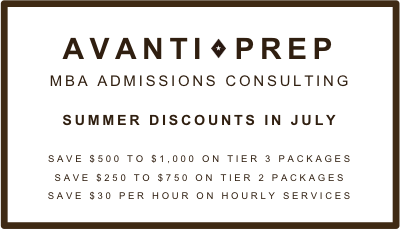 Poonam, founder and president of myEssayReview, is publishing interviews of her most recent successful students. This is the latest in the series. Here is a chat with Mansi, who was accepted into 5 top MBA programs –Kellogg, Wharton, INSEAD, Stanford, and Harvard. Mansi is headed to Harvard, her dream school.Mansi’s interview is published in 4 parts wherein she shares her background, goals, reasons to pursue MBA, unwavering preference for HBS, application strategy and preparation, her success mantra, advice on video essays, and much more. Now presenting the concluding part of the interview wherein Mansi shares her success mantra and her personal interests and hobbies.Poonam
Poonam, founder and president of myEssayReview, is publishing interviews of her most recent successful students. This is the latest in the series. Here is a chat with Mansi, who was accepted into 5 top MBA programs –Kellogg, Wharton, INSEAD, Stanford, and Harvard. Mansi is headed to Harvard, her dream school.Mansi’s interview is published in 4 parts wherein she shares her background, goals, reasons to pursue MBA, unwavering preference for HBS, application strategy and preparation, her success mantra, advice on video essays, and much more. Now presenting the concluding part of the interview wherein Mansi shares her success mantra and her personal interests and hobbies.Poonam: What is the Mantra of your astounding success? Not many people are able to achieve what you have achieved. That is why I would like to know about the Mantra of your phenomenal success.
Mansi: That is a tough one. I think everyone will have their own set of ways to achieve their goal. For me, number one mantra is hard work. In life, there is no short cut to success. It is the way you look at things. You have to have sleepless nights, and long days, and give enough time to achieve your goal, sacrifice other things in the life, and still maintain a balance. As you had rightly suggested- start early. The best way is to start early to give ample time to application.
The second Mantra is ‘strategy’. If I had pushed myself to apply to Harvard in Round I and had not listened to you, I am sure I could not have accomplished it. The kind of story that I had in Round I or the kind of confidence I had in my story in Round I was much less compared to what I had in Round II. Again, I came to know myself a lot more in four five months than the two months I had before Round I deadlines. So you have to strategize really well because your dream school deserves the best of your time, your strategy, and your hard work. I would advise applicants to give it enough time and thought, and strategize well.
The third Mantra is the ‘introspection’. Indian applicants have never gone through such a process; they have only prepared course material and taken exams. But B- school application is entirely a different process. It does have an exam which requires a lot of introspection, and it also has an interview process which truly focuses on your soft skills. Lastly, working on your weaknesses is also very important for which self-reflection is the key because unless you know your worth yourself, you will not know what you are weak at. Especially for the interview processes, you should be confident of handling your weaknesses and what you can do to mitigate them.
Poonam: That is right. It is a process of self-discovery, and by the time you reached Harvard Application, you had already discovered yourself.
Mansi: Absolutely.
Poonam: And I have memorized all your stories by heart.
Mansi: Yes. I know. And sometimes, I was actually amazed, when you would return my essays with comments that this example does not fit this essay as much as the other example. You remembered all my stories which at times I had forgotten. You rightly said that this is a process of self-discovery. I also remember the 30 minute Harvard interview that happened in Mumbai; those 30 minutes felt like 3 hours, as we had a conversation which I would normally have with somebody in 3 hours. It was short, yet it covered almost every aspect of my life, professional as well as personal. If I had not known about myself that well, I could not have given that 3 hours’ worth of information in thirty minutes.
Poonam: True. It has truly been a long and arduous journey. You must have made many personal sacrifices as well. Would you like to share those with us?
Mansi: Yes, Poonam. Very rightly said. You have to work hard towards what is really important to you. And in that particular process, you have to sacrifice other things to achieve what you really want to. As you are aware, I am married, and I had sacrificed a lot of my family time. At the same time, I am really thankful to my husband who has been immensely supportive all this while. I had to miss family time, festivals, get -togethers, and weddings. I am blessed to have a supportive family and husband. I will share this one particular incident when we were celebrating Deepawali at my in-laws place in Mumbai. I had gotten my first interview invite from Kellogg which was right after Deepawali, and my husband prepared for all pooja and stuff while I was preparing for my interview questions. So yes, I had sacrificed a lot of different things- birthdays, family functions, TV and movies, but I am sure that at the end of day, those are totally worth it.
Poonam: Definitely. They all must be very proud of you for this extraordinary achievement. I am proud of you.
Mansi: Thank you, Poonam. Yes, they are.
Poonam: Let us talk about something outside of professional area. What are your hobbies, interests? What are your favorite books?
Mansi: As you know very well, I love to dance. Throughout my entire application process, I used to go for my dance class at least once a week to rejuvenate myself. I occasionally read science fiction. I am not a regular reader though.
Poonam: You are a certified Scuba diver as well.
Mansi: Yes. I am a certified scuba diver. I have dived in many countries such as Malaysia, India, Maldives, and Thailand. I can dive up to 18ft. Next month, I and my husband are going to Thailand for another diving trip after a gap of one year.
Poonam: Very good. Mansi, will you like to share anything that I have not asked?
Mansi: I have discussed almost all the aspects of application process. Again, key parts of your application process are- have a strong GMAT score, partner with a good consultant, strategize in which Round and which schools you apply to, start early, give yourself enough time for self-reflection, and definitely work hard. There is no short cut to success. Give your best. I am sure you can achieve what you want.
Poonam: Thank you for sharing your story. Your story will be inspirational for the prospective applicants.
Mansi: Thank you, Poonam. This is not only my story; this is your story as well.
Poonam: It is really nice of you to think that way.
Mansi: This is a process you can’t do alone. This is a process where you need supportive people around you. So equal amount of thank you to you as well.
Poonam: Thank you so much. It was my privilege. I really enjoyed being part of your MBA journey. And I wish you good luck with Harvard. I hope you will have a wonderful time there. I will like to get in touch with you later.
Mansi: Definitely. I will keep you updated with my case studies at HBS.
Poonam: Wonderful. Thank you. It was a pleasure chatting with you.
Note:
Part 1- Mansi's Background, Goals, Reasons to do MBA, and Preference for HBShttps://myessayreview.com/student-interviews/indian-engineers-journey-5-top-mba-programs-including-dream-school-harvard/Part 2- Mansi's' Application Strategy, Planning and Preparationhttps://myessayreview.com/student-interviews/indian-engineers-journey-5-top-mba-programs-including-dream-school-harvard-part-2/Part 3- Mansis’ Most Challenging Part of the Application Process, and her advice on video essayshttps://myessayreview.com/student-interviews/indian-engineers-journey-5-tops-mba-programs-including-dream-school-harvard-part-3/This
interview was first published in
myEssayReview blog.
For questions, email Poonam at poonam@myessayreview.comLinkedIn/
Facebook

 The Wharton School at University of Pennsylvania has kept this set of essays simple. Specific advice on essays from a student reminds applicants that “the Admissions Committee is looking to understand more about you and your unique personality and how that can ultimately contribute to the Wharton community. We are a student-driven campus and need each and every MBA to bring something to the table.”
The Wharton School at University of Pennsylvania has kept this set of essays simple. Specific advice on essays from a student reminds applicants that “the Admissions Committee is looking to understand more about you and your unique personality and how that can ultimately contribute to the Wharton community. We are a student-driven campus and need each and every MBA to bring something to the table.”















